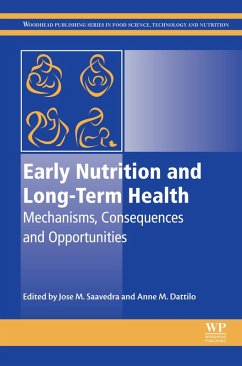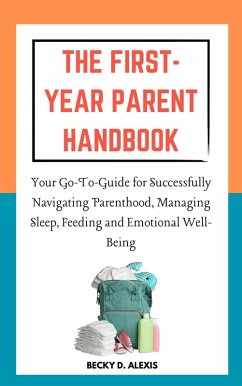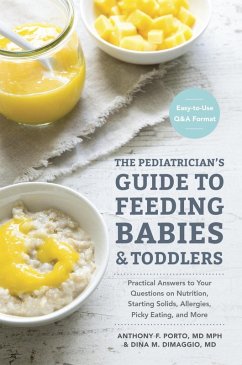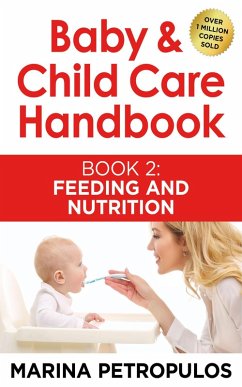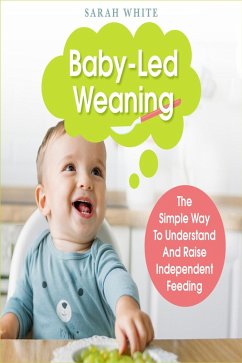
Dangers of Artificial Feeding in the First Six Months of a Child's Life (eBook, ePUB)

PAYBACK Punkte
0 °P sammeln!
"Dangers of Artificial Feeding in the First Six Months of a Child's Life" delves into the critical period shaping an infant's well-being. Crafted by authoritative voices in the field, this book empowers parents with invaluable knowledge for informed decisions on their child's nutrition.Breast milk's significance emerges as the optimal nourishment for infants. Backed by the World Health Organization, we explore the vital nutrients, antibodies, and growth factors that facilitate optimal development. Deviating from this recommendation carries potentially dire consequences.We examine the nutrition...
"Dangers of Artificial Feeding in the First Six Months of a Child's Life" delves into the critical period shaping an infant's well-being. Crafted by authoritative voices in the field, this book empowers parents with invaluable knowledge for informed decisions on their child's nutrition.
Breast milk's significance emerges as the optimal nourishment for infants. Backed by the World Health Organization, we explore the vital nutrients, antibodies, and growth factors that facilitate optimal development. Deviating from this recommendation carries potentially dire consequences.
We examine the nutritional inadequacy of artificial feeding. While formulas attempt to mimic breast milk, they pale in comparison. Breast milk nurtures the immune system, fortifying it against infections and shaping long-term health outcomes. Artificial feeding lacks these essential elements, leaving infants vulnerable to health risks.
Infants deprived of breast milk face heightened infection risks. Breast milk's antibodies defend against respiratory tract, gastrointestinal, and urinary tract infections. Artificial feeding exposes infants to increased susceptibility, amplifying the likelihood of falling prey to these infectious adversaries.
Artificial feeding's consequences extend to digestive health. Breast milk, tailored to suit an infant's developing digestive system, aids in healthy digestion. Artificial feeding often causes digestive issues and gastrointestinal distress, leading to constipation, diarrhea, and abdominal discomfort. Disruption of gut bacteria balance can have long-term repercussions.
We delve into breastfeeding's role in cognitive development. Breast milk, enriched with vital fatty acids like DHA, plays a pivotal role in brain development and cognitive function. Exclusive breastfeeding during the first six months positively impacts future IQ scores, emphasizing the enduring consequences of early nourishment.
The book illuminates potential long-term ramifications, including heightened risks of obesity, diabetes, asthma, and allergies associated with artificial feeding. Breastfeeding serves as a shield, offering protection through its unique composition. Deviating from exclusive breastfeeding heightens susceptibility to chronic diseases.
Beyond nutrition, we explore the emotional bond forged through breastfeeding. The intimate act nurtures a deep connection, fostering security, comfort, and attachment. This bond lays the foundation for emotional well-being and healthy social development.
In "Dangers of Artificial Feeding in the First Six Months of a Child's Life," parents gain vital information for informed choices. Embracing evidence-based insights empowers them to prioritize their child's optimal growth, development, and long-term health.
Breast milk's significance emerges as the optimal nourishment for infants. Backed by the World Health Organization, we explore the vital nutrients, antibodies, and growth factors that facilitate optimal development. Deviating from this recommendation carries potentially dire consequences.
We examine the nutritional inadequacy of artificial feeding. While formulas attempt to mimic breast milk, they pale in comparison. Breast milk nurtures the immune system, fortifying it against infections and shaping long-term health outcomes. Artificial feeding lacks these essential elements, leaving infants vulnerable to health risks.
Infants deprived of breast milk face heightened infection risks. Breast milk's antibodies defend against respiratory tract, gastrointestinal, and urinary tract infections. Artificial feeding exposes infants to increased susceptibility, amplifying the likelihood of falling prey to these infectious adversaries.
Artificial feeding's consequences extend to digestive health. Breast milk, tailored to suit an infant's developing digestive system, aids in healthy digestion. Artificial feeding often causes digestive issues and gastrointestinal distress, leading to constipation, diarrhea, and abdominal discomfort. Disruption of gut bacteria balance can have long-term repercussions.
We delve into breastfeeding's role in cognitive development. Breast milk, enriched with vital fatty acids like DHA, plays a pivotal role in brain development and cognitive function. Exclusive breastfeeding during the first six months positively impacts future IQ scores, emphasizing the enduring consequences of early nourishment.
The book illuminates potential long-term ramifications, including heightened risks of obesity, diabetes, asthma, and allergies associated with artificial feeding. Breastfeeding serves as a shield, offering protection through its unique composition. Deviating from exclusive breastfeeding heightens susceptibility to chronic diseases.
Beyond nutrition, we explore the emotional bond forged through breastfeeding. The intimate act nurtures a deep connection, fostering security, comfort, and attachment. This bond lays the foundation for emotional well-being and healthy social development.
In "Dangers of Artificial Feeding in the First Six Months of a Child's Life," parents gain vital information for informed choices. Embracing evidence-based insights empowers them to prioritize their child's optimal growth, development, and long-term health.
Dieser Download kann aus rechtlichen Gründen nur mit Rechnungsadresse in A, B, CY, CZ, D, DK, EW, E, FIN, F, GR, H, IRL, I, LT, L, LR, M, NL, PL, P, R, S, SLO, SK ausgeliefert werden.




